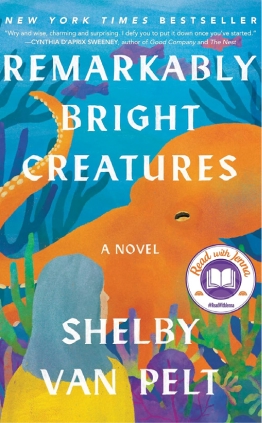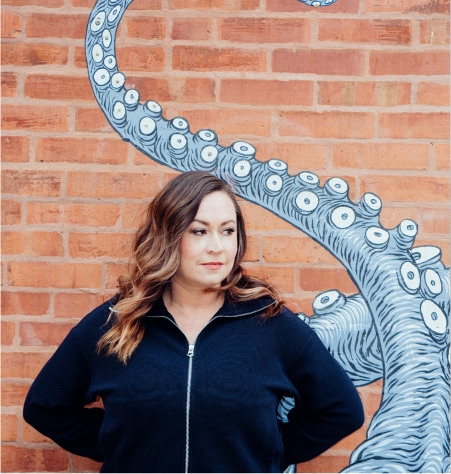
If you read Remarkably Bright Creatures and then recommended the book to a friend, Shelby Van Pelt ’02 wants to thank you.
Her debut novel, narrated in part by a curmudgeonly giant octopus named Marcellus, was published in the spring of 2022—and generated enthusiastic word-of-mouth sales that propelled it to the top of the nation’s best-seller lists.
Today, the book is still going strong, selling more than 1.5 million copies and earning a front-page story in The New York Times, among other notable accomplishments. It was also recently optioned by Anonymous Content for a feature-length film.
“I will always maintain that the highest compliment anyone can give an author is to personally recommend their work to a friend. And on that count, I’ve collected more compliments than anyone ever deserves. The grassroots growth is truly incredible,” Van Pelt said.
The book’s “wild idea” arrived while she was “watching YouTube videos of a captive octopus who was an escape artist. I thought it would be a fun voice to write, so I did,” said Van Pelt. She further explored the character of Marcellus in a writing workshop through a continuing education program at a local university. “Ten years later, I had a book.”
She likened the accomplishment of holding the published book in her hands as “a bit like seeing a custom concoction made of your soul and your brain, bottled up and packaged neatly for a retail shelf. … For me, and I’m sure for many fiction writers, our stories are rooted in our own anxieties and experiences. You’re putting it out there, and people are going to be rightfully entitled to their opinions.”
The novel’s sustained success has expanded Van Pelt’s book tour and included talks before large gatherings—among them, an Athenaeum audience in October 2023, when she was the first CMCer to speak as part of this year’s 40th Anniversary series.
Invited by her former Philosophy Professor Amy Kind, Van Pelt described speaking at the Ath as “thrilling, but a bit scary. … So many important, esteemed, influential speakers have come through the Ath. If you asked me back in 1998, as a new CMC student, whether I thought I would earn a place among them. … well, I think I would have been confused!”
Reflecting on how CMC professors have influenced her, Van Pelt notes that while fiction writing is “quite different than writing a college paper,” Professor Jack Pitney’s voice has remained in her head since she graduated cum laude.
As she built a career as a financial consultant, and throughout the 10 years she spent working on Remarkably Bright Creatures—and now the writing of a second novel—the image of Pitney’s “red pen crossing things out when I’m revising a draft” has persisted. His principles of “efficiency and effectiveness” still apply.
Upon her first visit to CMC, the Tacoma, Wash. native was impressed by the “vibe of intellectual curiosity and the discussions that spilled over into dorm rooms and dining halls. Having a debate about literature or philosophy was a cool, normal thing to do at CMC. I felt like I’d found my people.”
Among her best finds: future husband Drew Van Pelt ’02. The pair first met on a memorable WOA trip to the Sierra Nevada, strengthening their friendship as dorm mates (Phillips) and eventual PPE majors. They are raising their two children together in the suburbs of Chicago.
Noting that you “don’t have to identify as artsy to be an artist,” Van Pelt retains a deep CMC connection by serving on the Gould Center for Humanistic Studies’ Board of Advisors. While back on campus in October, she caught an inspired glimpse of life at the College, describing her interactions with current CMCers as “enough to put some pep in my middle-aged step. At the risk of sounding trite, it gave me more hope for the future.”
Due to her slow-simmering success as a fiction writer, Van Pelt also hopes she can be “a resource for students and alumni who are curious about the part of them that’s drawn to writing, music, art, but have one foot firmly planted in something like economics, accounting, or science.
“Because that was me! And those things are not inherently incompatible.”
